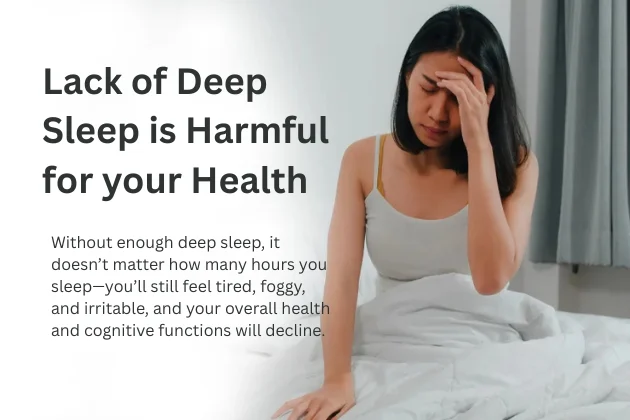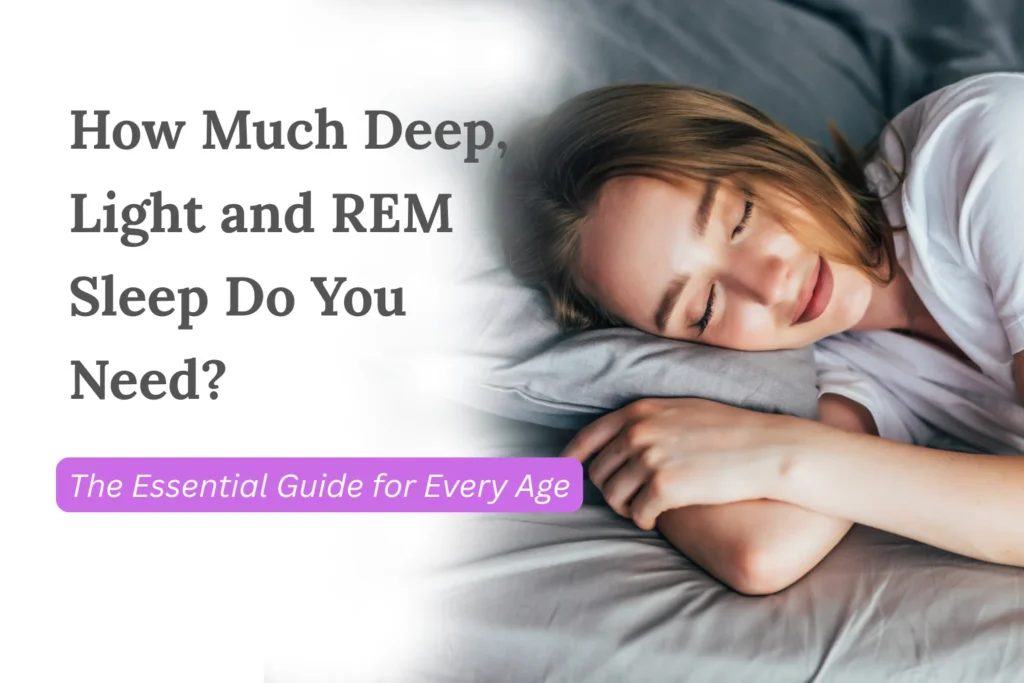Are you constantly waking up tired even after a full night’s rest? You’re not alone. Knowing how much deep sleep do you need can make a huge difference to your energy, mood, and overall health.
In this article from Lotus Femcare, a trusted women’s health and wellness resource, we’ll explore how much deep sleep do you need by age, the importance of REM and non-REM sleep, stages of sleep, why it’s important, and practical tips to improve your sleep quality.
Lack of Deep Sleep is Harming Your Health More Than You Think
It’s easy to assume that going to bed and waking up 8 hours later means you’re fully rested. But here’s the truth: not all sleep stages are created equal.
Deep sleep, the third stage of non-rapid eye movement (NREM) sleep, also known as slow-wave sleep (SWS), is crucial for your physical and mental health. It’s the time when your body repairs itself, consolidates memories, and recharges.
During this stage, your body:
- Repairs tissues and muscles
- Builds bone and strengthens the immune system
- Consolidates memories
- Balances hormones—especially important for women
Without enough deep sleep, it doesn’t matter how many hours you sleep—you’ll still feel tired, foggy, and irritable, and your overall health and cognitive functions will decline.

Let’s get into it and see what the science says about how much deep sleep you need and how to get it.
Sleep Stages: REM and Non-REM
Sleep stage consists of two main categories: REM (Rapid Eye Movement) sleep and non-REM sleep, both of which are vital for your physical and mental health.
Non-REM Sleep:
- Stage 1: Light sleep, transitioning from wakefulness.
- Stage 2: Slightly deeper sleep; heart rate and breathing slow down.
- Stage 3: Deep sleep (slow-wave sleep), crucial for restorative processes.
REM Sleep:
- Rapid eye movements, increased brain activity, vivid dreams
- Memory consolidation, emotional regulation, brain health
How Much REM Sleep Do You Need?
REM sleep constitutes about 20-25% of total sleep duration. Adults should aim for approximately 1.5 to 2 hours of REM sleep, which is essential for cognitive and emotional well-being.
How Much Light Sleep Do You Need?
Light sleep (Stages 1 and 2) is about 50-60% of your total sleep. For adults, that’s about 4-5 hours. Although lighter, it’s still important for sleep cycle transitions and mental refreshment.
How Much Deep Sleep Do You Need?
For most healthy adults, deep sleep should account for approximately 13–23% of total sleep time, which translates to about 1 to 2 hours of deep sleep each night, depending on age and overall sleep duration.
How Much Deep Sleep Do You Need by Age?
The amount of deep sleep you require varies based on several factors, primarily your age. Here’s a clear guideline on how much deep sleep do you need by age:
| Age Group | Total Sleep Recommended | Deep Sleep Requirement |
|---|---|---|
| Newborn (0-3 months) | 14-17 hours | 4-5 hours |
| Infants (4-11 months) | 12-15 hours | 3-4 hours |
| Toddlers (1-2 years) | 11-14 hours | 2-3 hours |
| Preschool (3-5 years) | 10-13 hours | 1.5-2 hours |
| School-age (6-12 years) | 9-12 hours | 1-2 hours |
| Teenagers (13-17 years) | 8-10 hours | 1-2 hours |
| Adults (18-64 years) | 7-9 hours | 1-2 hours |
| Seniors (65+ years) | 7-8 hours | 1-2 hours |
These are the guidelines from the National Sleep Foundation, but individual needs may vary.
Why Deep Sleep Matters?
Deep sleep affects your overall health big time:
Physical Health:
- Cell Repair: The Body repairs tissues and muscles after workouts or injuries.
- Immune System: Boosts your body’s ability to fight infections.
- Hormonal Balance: Regulates cortisol and growth hormone for overall wellness.
Mental Health:
- Stress Reduction: Reduces stress and anxiety.
- Memory Consolidation: Strengthens memory retention and cognitive performance.
- Mood Enhancement: Improves emotional stability and reduces depression symptoms.
Why Deep Sleep is Important for Women?
Women experience unique biological and hormonal changes that can directly impact their sleep. Menstruation, pregnancy, menopause, and general hormonal cycles can affect how much deep sleep women get.
- Menstruation and PMS: Many women report disrupted sleep patterns just before their periods due to hormonal fluctuations.
- Pregnancy: Hormonal changes, physical discomfort, and emotional stress reduce deep sleep.
- Menopause: Declining estrogen and progesterone levels cause frequent night waking, limiting deep sleep.
Signs You Aren’t Getting Enough Deep Sleep
If you regularly wake up exhausted, it might be due to insufficient deep sleep. Common symptoms include:
- You wake up tired even after 7-9 hours
- You need naps during the day
- You feel moody, anxious, or depressed
- You get frequent infections or slow healing
- Poor memory and concentration
- Increased stress and anxiety
- You gain weight or feel hormonally out of balance
If you’re experiencing these symptoms regularly, it’s time to upgrade your sleep.
Proven Ways to Get Deep Sleep
Get better sleep naturally with these evidence-based tips:
- Set a Consistent Sleep Schedule: Go to bed and wake up at the same time every day to regulate your body clock for better deep sleep.
- Limit Screen Time Before Bed: Reduce blue light from phones and computers an hour before bedtime.
- Improve Your Sleep Environment: Make your bedroom cool, dark, and quiet for better deep sleep.
- Avoid Stimulants and Alcohol: Don’t consume caffeine after 2 PM. Limit alcohol—it may make you sleepy, but it will disrupt deep sleep later.
- Exercise Regularly: Exercise increases deep sleep, but don’t exercise before bedtime.
- Mindfulness and Relaxation Techniques: Meditation or deep breathing can improve sleep.
- Eat Sleep Supporting Foods: Tart cherry juice (natural source of melatonin), Magnesium-rich foods (spinach, almonds, bananas), Complex carbs in dinner (brown rice, oats)
Real-Life Benefits of Better Deep Sleep
CASE 1: A 2022 American Sleep Association study found that people who increased their deep sleep from 45 minutes to 90 minutes per night experienced:
- 30% better mood and mental health
- 40% more daytime productivity
- 25% better overall health and 25% less illness
These stats show just how much of an impact good deep sleep can have on your life.
CASE 2: A 2020 Journal of Clinical Sleep Medicine study found that women who improved their deep sleep through better sleep habits reported:
- 35% less fatigue
- 30% better mood
- 25% better cognitive function
This study proves how much of a game-changer deep sleep can be.
Deep Sleep Tracking
Using sleep trackers can help track your sleep patterns. Devices like Fitbit or Oura Ring give you insight into your deep sleep stages so you can adjust your lifestyle.
FAQs
Q. How much deep sleep do adults need?
A: Adults need 1-2 hours of deep sleep per night to feel refreshed and healthy.
Q: Is too much deep sleep bad?
A: Generally, your body regulates deep sleep naturally. Consistent excessive deep sleep could be a sign of underlying health issues; see a healthcare provider.
Q: Can naps contribute to deep sleep?
A: Short naps don’t enter deep sleep stages much. If napping is interfering with nighttime sleep quality, limit or avoid napping.
Q: Do sleep aids increase deep sleep?
A: Some sleep aids can temporarily boost deep sleep, but use them under medical supervision as they can be habit-forming or have side effects.
Q. Do sleep trackers measure deep sleep accurately?
A: Sleep trackers give you estimates, and professional sleep studies give you the most accurate measurements.
Final Thoughts: Prioritize Your Deep Sleep
Knowing how much deep sleep you need is key to your health, mood, and overall life, especially for women going through various biological changes. Start applying these tips tonight and see big improvements in your well-being.
Keep in mind that deep sleep is not only about quantity; it also concerns the quality of sleep you achieve each night. Make rest a priority, and your body will reward you with improved health and energy.
You can also read: Postpartum Hair Loss: Causes, Duration & Treatment



